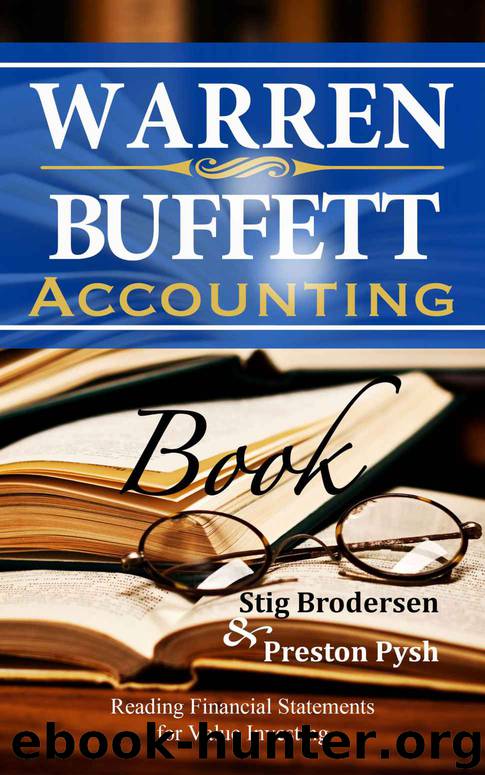Warren Buffett Accounting Book: Reading Financial Statements for Value Investing (Warren Buffett's 3 Favorite Books) by Stig Brodersen & Preston Pysh

Author:Stig Brodersen & Preston Pysh [Brodersen, Stig]
Language: eng
Format: azw3
Publisher: Pylon Publishing
Published: 2014-04-30T16:00:00+00:00
The first accounting regime you should know about is cash-based accounting, and the second is accrual accounting. As an intelligent stock investor, you’ll definitely want to become familiar with the latter—accrual accounting. Since publically traded companies are forced to use accrual accounting, that is what we’ll primarily be discussing throughout the remainder of the book.
Before moving to accrual accounting, let’s start with the easy concepts first. Cash-based accounting is essentially what the name says: accounting based on cash. A transaction is recorded only when cash is physically or digitally received into the bank account. It sounds easy enough, doesn’t it? It really is. Most people live their lives on a cash basis, so the subject should be familiar; for example, if you buy a cup of coffee at a Starbucks, you receive your coffee right after the cash leaves your pocket. This is cash-based accounting.
Now, very often in business the transfer of goods and services will not happen simultaneously with the cash payment. Consider a company working on a project that gets completed before the year’s end. Payment for the project, however, is received at the beginning of the following year. If the company is following cash- based accounting, the transaction would be recorded in the second year because the cash didn’t arrive in the account until then. This is the fundamental principle underlying cash-based accounting: transactions are recorded on the basis of inflow or outflow of cash when the money actually changes accounts, not when the service or product is provided or received.
This form of accounting is useful for small businesses that operate on a cash basis. Although this might be alright for “mom and pop”-style businesses, accounting laws do not allow for larger companies to conduct cash-based accounting. The reason for this is because it represents a slow and delayed way of tracking revenues and expenses. This is where accrual accounting comes in.
Accrual accounting
Download
This site does not store any files on its server. We only index and link to content provided by other sites. Please contact the content providers to delete copyright contents if any and email us, we'll remove relevant links or contents immediately.
Zero to IPO: Over $1 Trillion of Actionable Advice from the World's Most Successful Entrepreneurs by Frederic Kerrest(4527)
Machine Learning at Scale with H2O by Gregory Keys | David Whiting(4295)
Never by Ken Follett(3937)
Harry Potter and the Goblet Of Fire by J.K. Rowling(3848)
Ogilvy on Advertising by David Ogilvy(3608)
Shadow of Night by Deborah Harkness(3361)
The Man Who Died Twice by Richard Osman(3072)
Book of Life by Deborah Harkness(2932)
The Tipping Point by Malcolm Gladwell(2914)
Will by Will Smith(2911)
0041152001443424520 .pdf by Unknown(2843)
Purple Hibiscus by Chimamanda Ngozi Adichie(2828)
My Brilliant Friend by Elena Ferrante(2824)
How Proust Can Change Your Life by Alain De Botton(2807)
How to Pay Zero Taxes, 2018 by Jeff A. Schnepper(2646)
Hooked: A Dark, Contemporary Romance (Never After Series) by Emily McIntire(2550)
Rationality by Steven Pinker(2352)
Can't Hurt Me: Master Your Mind and Defy the Odds - Clean Edition by David Goggins(2324)
Borders by unknow(2304)
